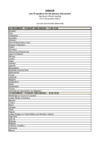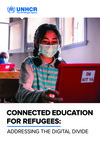Ethiopia: Somali refugees to be relocated away from border
This is a summary of what was said by UNHCR spokesperson Jennifer Pagonis – to whom quoted text may be attributed – at today's press briefing at the Palais des Nations in Geneva.
In Ethiopia today (Friday), UNHCR teams are expected to start relocating a group of 500 newly-recognized Somali refugees who fled from renewed conflict in strife-torn south and central Somalia over the last year. They have been staying around the Kebribeyah area, near the Somali border in eastern Ethiopia and are being relocated to a re-opened UNHCR camp at Teferi Ber.
The refugees are part of a group of 4,000 Somali refugees who have recently been granted refugee status by UNHCR and the government's Authority for Refugees and Returnees Affairs (ARRA). An estimated 7,000 additional Somalis who also claim to have fled fighting and insecurity in Somalia, are waiting to be screened at other sites in eastern Ethiopia.
The new camp site at Teferi Ber, some 120 km north of Kebribeyah, was formerly a UNHCR camp which in the 1990s hosted some 49,000 mainly Somalis refugees who had fled fighting in their country. The camp was officially closed in 2001 after all the refugees returned, mainly to the self -declared republic of Somaliland.
After arriving at Teferi Ber, the refugees will spend three days in a reception centre where they will be allocated plots of land to construct homes and given building materials. They will also be given food as well as tarpaulins, blankets, sleeping mats, kitchen sets, jerry cans, kerosene stoves, and soap. The ARRA has established a temporary health centre until permanent structures can be built.
The Somali Region of Ethiopia already hosts more than 16,500 refugees. With the new arrivals, the total is 20,300. At the peak of the Somali refugee crisis in the early 90s, the region hosted 628,000 refugees in eight camps. The overwhelming majority went home between 1997 and 2005, and all of the camps were closed except a camp at Kebribeyah.
Related news and stories
Thousands of newly arrived Somali refugees in Ethiopia relocated to new settlement
Samira's Story
Drought brings life-threatening food shortages for refugees in Ethiopia
100,000 new Somali refugees arrive in Ethiopia in the past month, UN and partners are calling for urgent funding
UNHCR teams and partners rush assistance to some 100,000 newly arrived Somali refugees in hard-to-reach area of Ethiopia
As the Horn of Africa drought enters a sixth failed rainy season, UNHCR calls for urgent assistance
-

Statement of UNDP Opening by Mr. Achim STEINER
14 Dec 2021 -

Statement of Japan Spotlight session
14 Dec 2021 -

Statement of Turkey_ Ms. Fatma ŞAHİN (Turkish)
14 Dec 2021 -

Employment Pathways
-

Refugee women scale Atlas mountain to tackle gender violence
13 Dec 2021 An all-female group including 13 refugees from six countries set out to climb Mount Toubkal – Morocco's highest peak – to highlight the struggle to end violence against women. -

Rapid analysis on meaningful participation pledges
13 Dec 2021 The infographic provides an overview of pledges related to meaningful refugee participation submitted at the Global Refugee Forum. The analysis includes both pledges that have meaningful participation as a main objective and pledges that specifically mention the intention to involve persons of concern in implementing its activities. -

High-level Officials Meeting List of speakers
13 Dec 2021 List of speakers for the High-Level Officials Meeting (December 2021). -

Connected Education for Refugees: Addressing the Digital Divide
13 Dec 2021 UNHCR released the Connected Education For Refugees: Addressing the Digital Divide report that provides an overview of the current status and challenges faced by refugees in accessing digital learning opportunities during the COVID-19 pandemic. The report also highlights the additional measures taken to extend access to refugee-hosting communities, putting forward recommendations on how to better design for more inclusive digital learning programmes that can benefit all learners. -

Operational Strategy for Climate Resilience and Environmental Sustainability 2022-2025
13 Dec 2021 This document explains UNHCR's plan of action to mitigate the impact of climate change on forcibly displaced people and their hosts, support their resilience and minimize the environmental footprint of humanitarian assistance. The strategy aims to improve the predictability of UNHCR's engagement in responding to emergencies brought on by climate-related and other natural hazards; incorporate climate and environmental considerations into responses; and improve the sustainability of the end-to-end supply chain.
